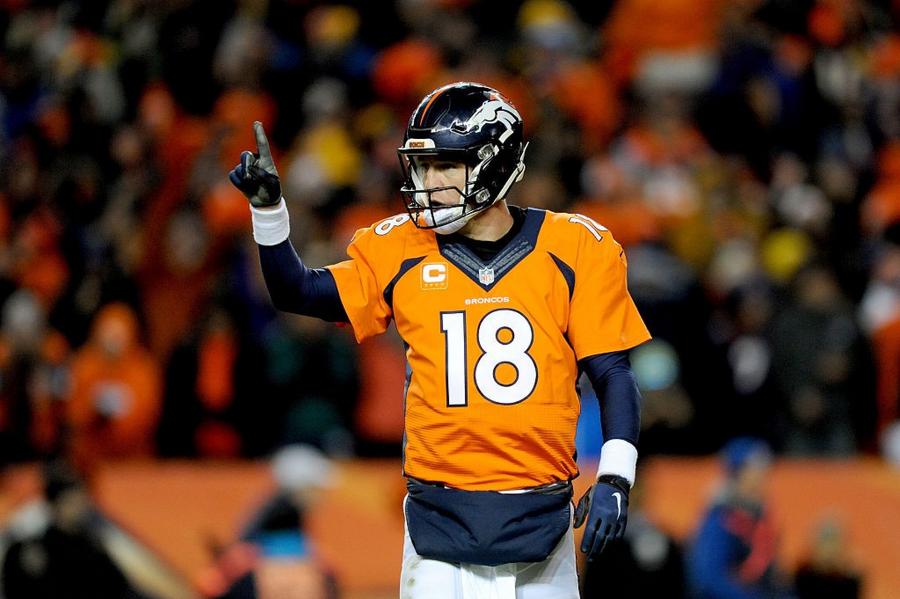When the Denver Broncos and New England Patriots kick off Sunday to decide who has the best team in the American Conference of the NFL, for most of the players the goal is clear. They want to win. They want the chance to play in the Super Bowl and earn the title of world champions. They want the glory.
However, for at least one player it will be a chance to earn a little more money as well as the glory. When Peyton Manning restructured his contract after last season he did give the team some relief under the salary cap by reducing his salary from $19 million to $15 million.
What a guy, right? Well, he didn't do it out of the goodness of his heart. He just agreed to earn it another way. Should he guide the Broncos to victory in the AFC championship game, he would earn a $2 million bonus. Follow that up with a win in the Super Bowl and he earns another $2 million.

Photo by Dustin Bradford/Getty Images
Technically, the two bonuses are classified as NLTBE, or 'not likely to be earned.' An NLTBE bonus is a way for a team to put off having part of a player's salary applied to the salary cap. Should the incentive be reached, the value of it counts toward the next season's salary cap.
If it was a LTBE bonus (likely to be earned) it would count towards the salary cap after the player earns it. That type of bonus would do the team no good in this case since the value of the bonus would apply to the current season's salary cap, so there would be no relief in restructuring unless the bonus was not earned.
The team doesn't get to choose which designation goes on the bonus. If the goal was achieved last season it qualifies as a LTBE bonus. If it was not, then it qualifies as NLTBE. Since the Broncos did not win the AFC championship or Super Bowl last season his bonuses are considered NLTBE.
That's great for Peyton, but doesn't that just screw the Broncos over next season? Not necessarily.
Teams have to have room under the salary cap for all LTBE bonuses. However, if the goals needed to earn them are not met the team is allowed to apply the space they had to keep open to next year's salary cap. If a team has more LTBE bonuses not earned than NLTBE bonuses earned they can actually receive a credit towards the following year's salary cap.
So, should the Broncos go on to win the Super Bowl and have $4 million in LTBE bonuses from other players not be earned then Peyton's bonuses will not count against next season's salary cap.
Manning is already slated to be a $21.5 million cap hit next season. While $25.5 million would be a pretty sizable hit, he would not be the largest in the league (Drew Brees is going to count $30 million towards the Saints' cap in 2016).
However, should he get cut or retire he will only cost the team $2.5 million in cap space next season, a savings of $19 million. With injuries making his current level of play pale in comparison to what made him famous many expect him to ride off into the sunset at the end of this season whether it is after the AFC championship or the Super Bowl.
Riding off with a $4 million bonus sure wouldn't be a bad way to go.
/2016/03/GettyImages-514188274.jpg)
/2009/10/Peyton-Manning-1.jpg)
/2015/08/papa.jpg)
/2018/03/GettyImages-96346720-e1520925641810.jpg)
/2016/02/GettyImages-501241228.jpg)
/2020/03/GettyImages-813492344.jpg)
/2023/10/elaine-wynn.jpg)
/2013/06/Wink-Martindale-1.jpg)
/2020/10/cate.jpg)
:strip_exif()/2020/06/taylor.png)
/2021/04/William-Levy-1.jpg)
/2021/12/peter.jpg)
/2010/03/nc.jpg)
/2020/03/steve-wynn.jpg)
/2010/11/Sara-Bareilles.jpg)
/2019/02/jalex.jpg)
/2013/01/Al-Jarreau.jpg)
/2014/06/oscar.jpg)
/2021/10/John-Boyega.jpg)
/2018/04/GettyImages-942450576.jpg)
/2014/05/Daisy-Ridley.jpg)
/2022/01/audra.jpg)
/2021/01/alec-guinness.jpg)